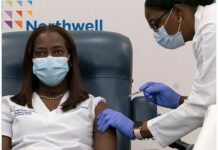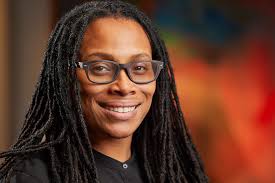The “cure” of a baby from the disease HIV made news globally but missing from the story is the fact that a Caribbean-born doctor of Johns Hopkins’ Children’s Center in Baltimore led the team of researchers who found the “treatment.”

Guyana-born Dr. Deborah Persaud, a virologist at Johns Hopkins University in Baltimore, said in a news conference at the Conference on Retroviruses and Opportunistic Infections in Atlanta on Sunday, that the child from Mississippi was born with HIV two-and-a-half-years ago but now appears to be AIDS free.
The child, a little girl, has been off medication for about a year with no signs of infection. If the child remains free of HIV, it would mark only the world’s second known cure. The infant described in the report underwent remission of HIV infection after receiving antiretroviral therapy within 30 hours of birth.
The investigators say the prompt administration of antiviral treatment likely led to this infant’s cure by halting the formation of hard-to-treat viral reservoirs—dormant cells responsible for reigniting the infection in most HIV patients within weeks of stopping therapy.
Specialists say the finding offers exciting clues for how to eliminate HIV infection in children. “Maybe we’ll be able to block this reservoir seeding,” Persaud said.
The finding, the investigators say, may help pave the way to eliminating HIV infection in children.
A report on the case was presented Sunday at the 20th Conference on Retroviruses and Opportunistic Infections (CROI) in Atlanta.
“Prompt antiviral therapy in newborns that begins within days of exposure may help infants clear the virus and achieve long-term remission without lifelong treatment by preventing such viral hideouts from forming in the first place,” Persaud said.
The researchers say they believe this is precisely what happened in the child described in the report. That infant is now deemed “functionally cured,” a condition that occurs when a patient achieves and maintains long-term viral remission without lifelong treatment and standard clinical tests fail to detect HIV replication in the blood.
The child described in the current report was born to an HIV-infected mother and received combination antiretroviral treatment beginning 30 hours after birth. A series of tests showed progressively diminishing viral presence in the infant’s blood, until it reached undetectable levels 29 days after birth. The infant remained on anti-virals until 18 months of age, at which point the child was lost to follow-up for a while and, the researchers say, stopped treatment. Ten months after discontinuation of treatment, the child underwent repeated standard blood tests, none of which detected HIV presence in the blood. Test for HIV-specific antibodies—the standard clinical indicator of HIV infection—also remained negative throughout.
“Our next step is to find out if this is a highly unusual response to very early anti-retroviral therapy or something we can actually replicate in other high-risk newborns,” Persaud says.
Persaud was the lead author on the report, and University of Massachusetts Medical School immunologist Katherine Luzuriaga, headed a team of laboratory investigators. Pediatric HIV specialist Hannah Gay, M.D., associate professor of pediatrics at the University of Mississippi Medical Center, provided treatment to the baby.
Persaud was born on Aug. 23, 1960 in Guyana, South America and migrated to the U.S. at age 16. Her parents had divorced, and when she was 10, her mother went to America to find work. Six years later, Persaud and her three siblings joined her in Bushwick, Brooklyn, N.Y.
She went on to earn a B.A., York College (CUNY) and an M.D. from NYU Medical School before doing her pediatric residency at Columbia-Presbyterian.
Persaud was a medical student at NYU in 1985 when the first cases of HIV were being identified in young, gay men. During her residency at Columbia Presbyterian, she started seeing infants presenting with the same type of pneumonia.
In 1997, she was hired by John Hopkins and by 2005 had won the Elizabeth Glaser Scientist Award. The award, which funds AIDS research, gave her $700,000 for five years to better understand drug-resistant HIV in children both in the United States and abroad.
Today, eight years later, Persaud not only fulfilled this mission but could have helped find a cure for HIV in children, a historical achievement.
Her career highlights include the Aaron Diamond Fellow, NYU, the Doris Duke Clinical Research Fellow, JHUSOM and the Elizabeth Glaser Scientist Award.
She is married to William Moss, M.D., M.P.H, pediatric infectious diseases specialist and has three children: Taylor, 10; Ian, 8; Soraya, 6.
Asked what people should know about her she told The DOME, a John Hopkins publication: “I am the American dream.”



